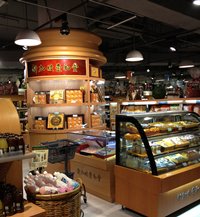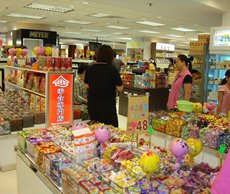In recent years, concerns over food safety and quality on the Chinese mainland have undermined consumer confidence, raising demand for imported and internationally packaged food and beverages. Given the rising incomes and lifestyle aspirations among mainland consumers, many are now willing to sample a range of premium imported foods and drinks.
According to official statistics, the mainland’s packaged food and beverage market grew dramatically, from US$144.2 billion in 2008 to US$254.4 billion in 2012. The value of imported processed food and beverages, meanwhile, rose from US$13.4 billion in 2008 to US$35.1 billion in 2012, an average annual increase of more than 27 per cent.
Safety Concerns
A series of recent focus group discussions, organised by the Hong Kong Trade Development Council (HKTDC), showed that, where possible, the preferred choices of mainland consumers are products imported in their original packaging, followed by mainland-manufactured foreign brands. Domestic brands trail in third place.
Most consumers are driven to buy imported food and beverages following safety concerns about comparable products sourced locally. Alarmed by the number of tainted milk powder incidents on the mainland, for instance, many focus group participants said they preferred to buy imported milk products, in their original packaging, for their children. With the health of children deemed more important than price concerns, such imported products are clearly the preferred option for many mainland parents.
Leisure Food
Mainland consumers are now more willing to try a wider variety of foodstuffs. This is largely due to the greater number and wider coverage of available buying channels, the increase in the variety of food on offer and greater shopping convenience. Wider food choices have led many consumers to develop an appetite for novel foods, particularly leisure food items.
 | |
| As demand on the mainland continues to grow, so, too, will opportunities for Hong Kong companies to introduce niche food products from overseas |
With their unique styles and tastes, as well as affordable unit prices, imported packaged leisure food items now have a substantial and committed consumer base across a wide age group.
A number of products, particularly French and Italian chocolate, have found favour with consumers. Leisure food items seem to buck the overall consumer preference for healthier eating. While low-sugar, low-sodium and low-cholesterol items remain popular, leisure food items have accrued a sizeable following, thanks to their appealing flavours and presentation. These items, though, are not seen as food staples, and healthy eating is not a consideration when indulging in them.
Treating Friends
With their rising living standards, many consumers now enjoy sampling foreign foods and beverages. The unique tastes of such items have proven a popular way of treating friends and relatives, either at social occasions or simply to offer a little self-indulgence. It is not uncommon, for instance, for mainland consumers to purchase a large keg of imported German beer – in its original packaging – to take to a social gathering. Imported food and beverages are also increasingly popular with mainland companies, hotels and private clubs. A number of companies now serve ostensibly imported foodstuffs at business functions as a way to enhance their corporate image and maximise publicity.
Hong Kong Opportunities
As demand for imported food on the mainland continues to grow, so too will the opportunities for Hong Kong companies to introduce niche food products from overseas. The city is well-positioned to become a key distribution centre for imported food and beverages destined for the mainland. It can also serve as a product sales and market-testing centre for foreign food companies looking to target the mainland market. This will help them formulate the right marketing and promotional strategies for their products.
The majority of food and beverage items and raw food material available in Hong Kong is imported, with many of the companies engaged in food and beverage-related businesses. In 2012, Hong Kong exported HK$41.6 billion worth of processed food and beverages to a number of overseas destinations. Of this, re-exports accounted for more than 90 per cent (HK$38.7 billion). The mainland is, of course, one of the major markets for re-exports from Hong Kong. In 2012, some HK$12.1 billion of processed food and beverages were re-exported via Hong Kong to the mainland. This accounted for about 31 per cent of Hong Kong’s total re-exports in this sector.
Distribution Centre
Many overseas food and beverage suppliers and distributors have established their own sales network in Hong Kong. As the vast China market continues to expand, many foreign brands are actively looking to access this market. Foreign food imported into the mainland is subject to customs duties of between 10 per cent and 35 per cent, as well as a 17 per cent value-added tax. In light of this, suppliers and distributors have been reluctant to import substantial quantities of unproven products to the mainland.
 | |
| Hong Kong companies have a greater understanding of mainland consumers than many of their overseas counterparts |
As Hong Kong does not levy any customs duties on food imports, however, the city is an ideal distribution centre for imported food and beverage items destined for the mainland. Importers can first ship the products to Hong Kong, then trans-ship them to mainland destinations in response to local demand, greatly increasing the flexibility of their operations.
A number of well-established Hong Kong logistics and transportation companies also act as food agents and distributors across both Hong Kong and the mainland, selling to large wholesalers, supermarkets, food suppliers, hotels, Chinese and western restaurants, fast-food shops and airline catering services. The food-trading business of these companies covers a range of services, including sourcing, processing, distribution, even direct catering. With their own transportation teams and distribution networks, these companies can offer professional guidance and support to overseas suppliers and distributors with no experience in the Asian food market.
Marketing Advantage
Hong Kong companies frequently provide specialized, value-added services for foreign food suppliers across a range of areas, including re-packaging, brand building, promotion and marketing. In the case of dairy products, for example, many mainland consumers prefer such items to come with mathematical formulas printed on the packaging, believing that such embellishments will help promote children’s mental development and enhance their learning capabilities. Foreign distributors would largely be unaware of this mainland consumer preference.
In this regard, Hong Kong companies can act as an effective middleman, bridging the cultural gap between foreign brands and the culturally distinct mainland consumer market. Hong Kong companies have a far greater understanding of mainland consumers than many of their overseas counterparts. Foreign companies would be well-advised to use the services of Hong Kong businesses when it comes to establishing and promoting a new premium food or beverage brand on the mainland.
Trendsetting Hong Kong
Given their access to local retail channels, Hong Kong food distributors can help overseas suppliers test consumer response to their products in the Hong Kong market. This would allow them to formulate an effective marketing strategy prior to entering the mainland market. In the HKTDC Survey on “China’s Middle-Class Consumers,” 84 per cent of respondents endorsed the view that “Hong Kong is the place of origin of fashion trends and the trendsetter.”
In line with this widely perceived view, mainland consumers frequently purchase food products, either as gifts or for their own consumption, when they visit Hong Kong. By taking them back to the mainland, they act to boost Hong Kong’s highly regarded effectiveness for promoting premium food products.
font: http://www.hktdc.com/info/web/mi/article.htm?LANGUAGE=en&ARTICLE_ID=1X09WGI6&DATASOURCE=hkti